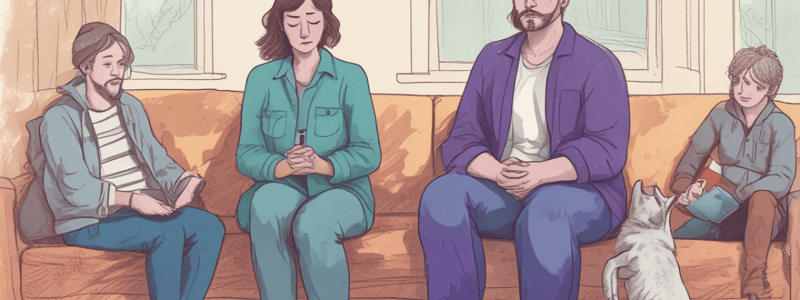Podcast
Questions and Answers
What is a crucial step for moving forward after escaping an abusive situation?
What is a crucial step for moving forward after escaping an abusive situation?
- Seeking professional mental health help (correct)
- Isolating oneself from others
- Ignoring the past experiences
- Avoiding any discussion about the abuse
Where can someone who has been abused seek immediate medical help?
Where can someone who has been abused seek immediate medical help?
- A hospital or urgent care center (correct)
- A grocery store
- A local park
- A friend's house
What can mental health therapy sessions provide for survivors of abuse?
What can mental health therapy sessions provide for survivors of abuse?
- A place to hide from society
- A platform to seek revenge
- A means to suppress emotions
- A safe space to share feelings and fears (correct)
Which professional can you talk to if you know someone who has experienced abuse?
Which professional can you talk to if you know someone who has experienced abuse?
What should people who commit abuse or neglect do?
What should people who commit abuse or neglect do?
What type of training may benefit those who commit sexual abuse?
What type of training may benefit those who commit sexual abuse?
What is one of the primary goals of mental health therapy for abuse survivors?
What is one of the primary goals of mental health therapy for abuse survivors?
Why is it important to seek professional help after an abusive situation?
Why is it important to seek professional help after an abusive situation?
What can professional therapy sessions assist with besides sharing feelings?
What can professional therapy sessions assist with besides sharing feelings?
Who can mandated reporters report to if they suspect abuse or neglect?
Who can mandated reporters report to if they suspect abuse or neglect?
Flashcards are hidden until you start studying
Study Notes
Abuse and Neglect
- Abuse is the violent mistreatment of another person, occurring in families, between friends, among classmates, or between romantic partners.
Types of Abuse
Physical Abuse
- Behaviors that cause bodily harm to another person
- Signs of physical abuse include:
- Bruises
- Black eyes
- Welts
- Burns
- Cuts
- Choking
- Slapping
- Biting
- Changes in behavior (anxiety, depression)
Emotional Abuse
- Attitudes, controlling behaviors, or words that harm a person's mental and emotional health
- Signs of emotional abuse include:
- Loss of self-confidence
- Fear
- Extreme upset
- Withdrawal from relationships and social activities
- Examples of emotional abuse:
- Using threats or insults
- Withholding love to control behavior
- Ridiculing a person's identity
- Calling a person names
- Isolating a person from supportive relationships
Sexual Abuse
- Characterized by sexual violence, including sexual assault or sexual harassment
- Signs of sexual abuse may include:
- Extreme anxiety
- Difficulty sleeping
- Nightmares
- Bedwetting
- Fear of being alone with certain people
Financial Abuse
- Using money to exert power in a relationship
- Examples of financial abuse include:
- Stealing a person's money
- Giving gifts or money and expecting something in return
- Withholding money needed to buy necessities
- Most commonly occurs between romantic partners and between adult children and their aging parents or guardians
Cycle of Abuse
- Abusive behavior follows a cycle of four stages:
- Tension building
- Incident
- Reconciliation
- Calm
- The cycle of abuse repeats unless someone acts to break the cycle
Consequences of Abuse
- Physical, mental, and emotional consequences, including:
- Injuries
- Brain damage
- Blindness
- Motor impairments
- Cognitive impairments
- Cardiovascular disease
- Cancer
- Liver disease
- Obesity
- Long-term effects on mental health, including:
- Depression
- Anxiety
- Eating disorders
- PTSD
Intimate Partner Violence
- Abuse between two people who are or were married, dating, or in a romantic relationship
- Types of intimate partner violence include:
- Physical abuse
- Emotional abuse
- Sexual abuse
- Financial abuse
- People who have experienced intimate partner violence may:
- Have physical injuries
- Experience depression or anxiety
- Feel socially isolated and alone
- Have difficulty trusting others
Sibling Abuse
- Mistreatment of one sibling by another
- Forms of sibling abuse include:
- Physical abuse
- Emotional abuse
- Sexual abuse
- Healthy sibling relationships do not involve patterns of fear, pain, or control
Elder Abuse
- Abuse of an older adult
- Forms of elder abuse include:
- Physical abuse
- Verbal abuse
- Emotional abuse
- Sexual abuse
- Financial abuse
- Neglect
- Many cases of elder abuse go unreported, leading to feelings of helplessness, loneliness, and distress
Preventing and Responding to Abuse
- Factors affecting abuse include:
- Risk factors (history of abuse, mental health conditions, emotional immaturity)
- Protective factors (interpersonal skills, emotional maturity, respect for others)
- Increase protective factors by:
- Promoting health for yourself, your family, and your community
- Improving mental, emotional, and social health
- Surrounding yourself with healthy relationships
- Educating yourself and others about the needs of others and effective caregiving
- Recognize and report abusive behavior by learning about signs of abuse and neglect, and educating others about the definition of abusive behavior and the signs of abuse
Studying That Suits You
Use AI to generate personalized quizzes and flashcards to suit your learning preferences.




